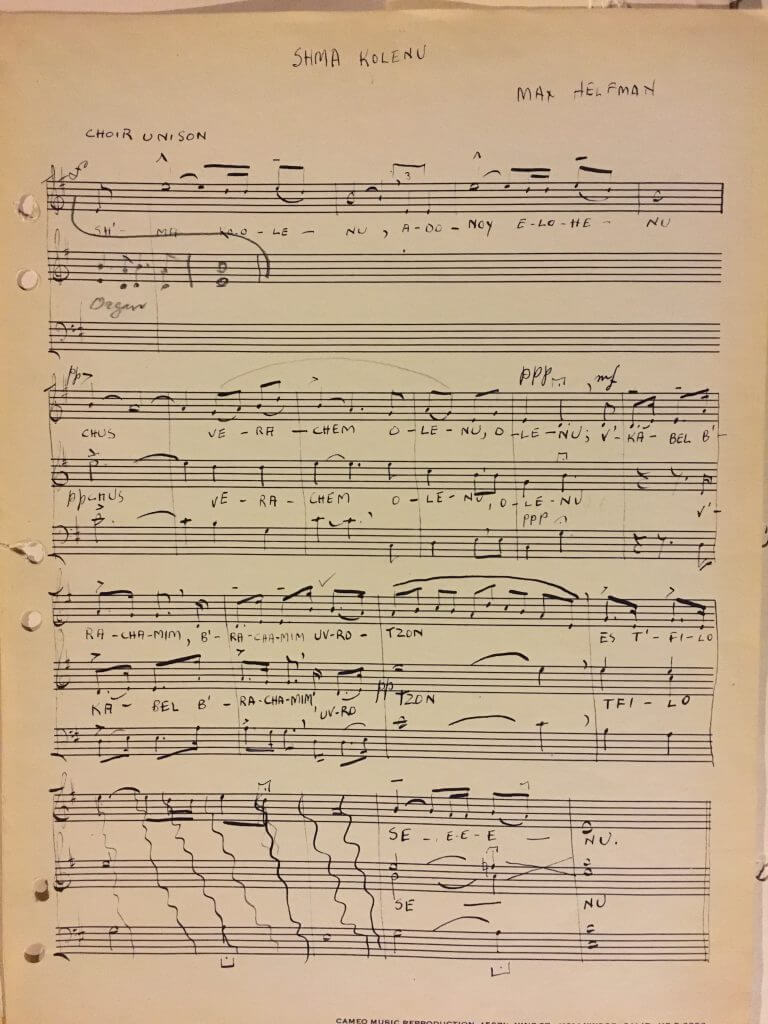Which composers have most influenced the creation of American Jewish Music across the generations? What are their personal stories? Who did they influence? What can we learn from them? These are the types of questions that direct the research projects supported by the Lowell Milken Fund for American Jewish Music.
During the summer of 2018, two graduate student researchers were kept busy. One researched composers and their interrelationships across generations. The other focused exclusively on one composer, Max Helfman. The Milken Fund also co-sponsored The Second International Symposium of the Arts of Performance and Jewishness – “The Dybbuk – Between Two Worlds – A Century of Metaphors,” which took place on August 14 in Buenos Aires.
Understanding the Field
Graduate student researcher Kacie Morgan focused her energies on analyzing the influencers and interrelationships of composers across generations. She created a visual mapping of the relationships, working from a selection of oral histories of twentieth-century Jewish composers and cantors from the Milken Archive. Kacie analyzed who was being mentioned, by whom, and how often.
“After a messy text analysis through Python (a programming language), I got a list of over 8,000 ‘people’ — several hundred of which were actually holidays, time stamps, or sound effects,” she said. “This was an initial result that no one was really expecting. Turns out the computer thinks that Rosh Hashanah is the most talked about ‘person’ in these oral histories.”
After accounting for the computer’s misunderstanding, Kacie was able to provide an important body of information which will be of great support to future research.
Understanding the Contributions of One Person
Graduate student researcher Ray Ace focused on the contributions of a specific composer, Max Helfman. Helfman, along with a number of the giants of the field of American Jewish Music, worked at Sinai Temple, located on Wilshire Blvd., in Los Angeles.
Ray’s research conditions were not always easy. Working in the Sinai Temple Archive, which Ray described as “a small, attic-like space directly under the temple’s organ that is used to store furniture, books, garments, and other odds and ends,” created numerous challenges.
Ray spent several weeks leafing through the sheet music in the archive, analyzing handwriting, documenting and photographing anything that could be found which was composed or arranged by Helfman. “Despite some archival dangers encountered along the way – large quantities of dust and the organ’s wind turbine suddenly booting up three feet from my head one Friday,” Ray said. “I managed to compile a large list of works by Helfman, some of which are only available in the Temple Archive.”
The result of Ray’s work will include a performance of Max Helfman’s music in a concert at Sinai Temple in the spring of 2019. Presented by the Milken Fund, many of the pieces will receive their first public performance. Ray’s work was supported by a University of California Humanities Research Initiative “Emerging Humanities” Grant for a partnership between the Milken Fund and Sinai Temple.
Sharing Scholarship
The Milken Fund is also committed to sharing scholarship. They co-sponsored The Second International Symposium of the Arts of Performance and Jewishness which took place on August 14 in Buenos Aires, Argentina. The event, “The Dybbuk – Between Two Worlds – A Century of Metaphors,” was the result of collaborative efforts between the Universidad of Buenos Aires, UCLA, Hebrew University of Jerusalem, and the Universidad Nacional de Tres de Febrero. Post-Doctoral Scholar Lillian Wohl served on the organizing committee and presented at the event on the panel, “Jewish Mysticism and Musical Creation.” The keynote address was delivered by Israeli musicologist Edwin Serioussi, winner of the 2018 Israel Prize.
The symposium brought into focus the academic study of the arts with the objective to grow this area of knowledge from an interdisciplinary perspective. Transcending the academic arena, lecturers and researchers associated with the initiative sought to create spaces of intellectual exchange with other institutions and specialists, as well as to disseminate knowledge about Jewish culture to the general public.
Find our more about the Lowell Milken Fund for American Jewish Music, here.


